人教版(2019)必修第一册 Unit 1 Teenage life Grammar 课件(14张PPT)
文档属性
| 名称 | 人教版(2019)必修第一册 Unit 1 Teenage life Grammar 课件(14张PPT) | 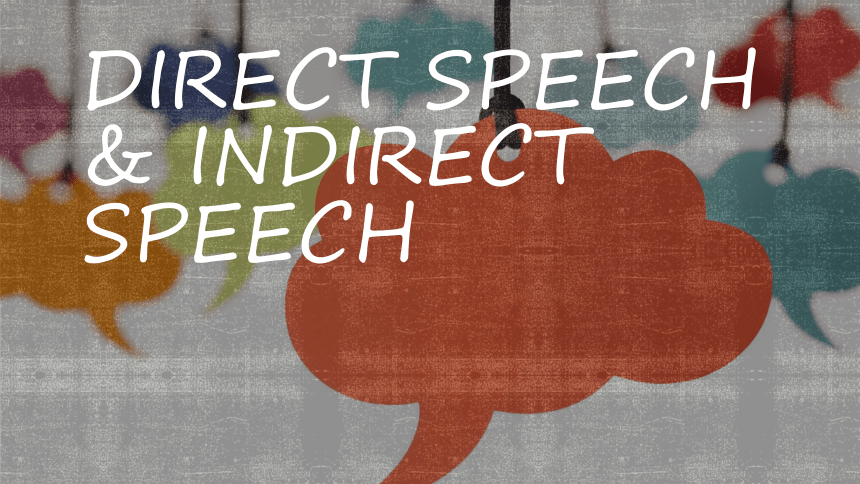 | |
| 格式 | pptx | ||
| 文件大小 | 621.3KB | ||
| 资源类型 | 教案 | ||
| 版本资源 | 人教版(2019) | ||
| 科目 | 英语 | ||
| 更新时间 | 2023-07-23 19:10:16 | ||
图片预览

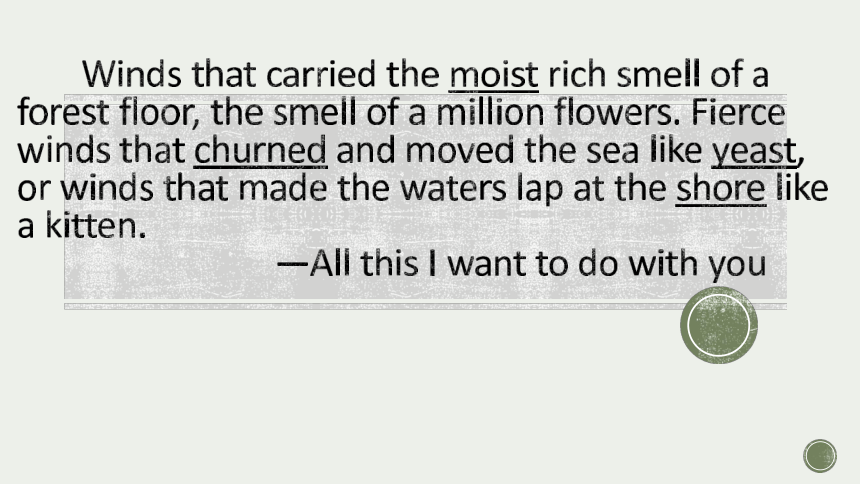
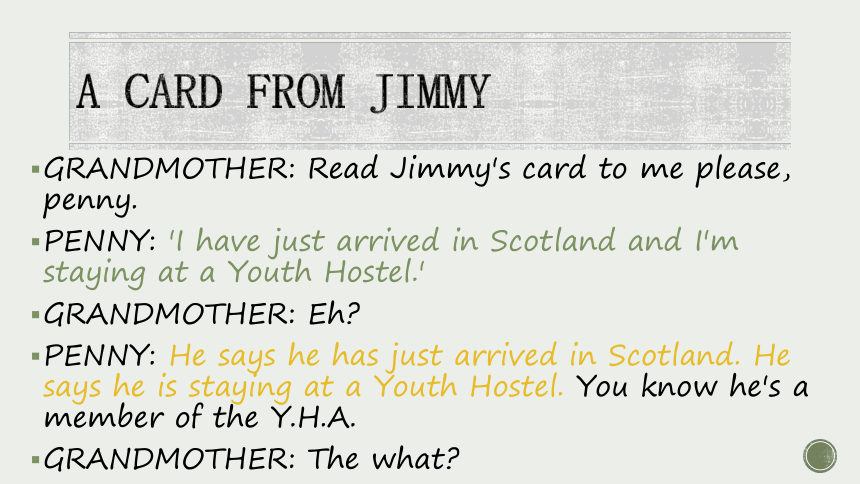
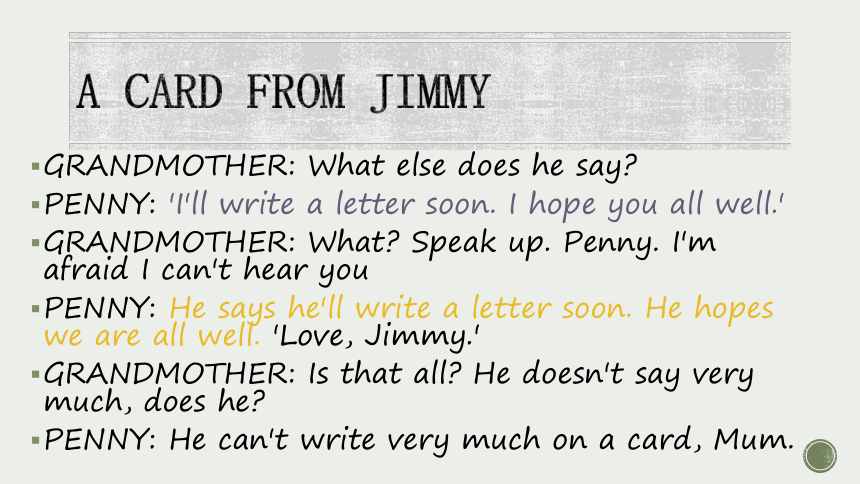
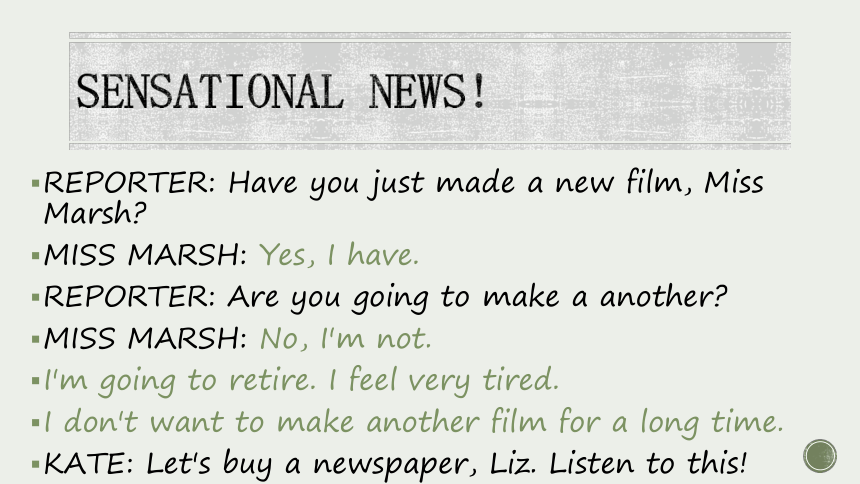
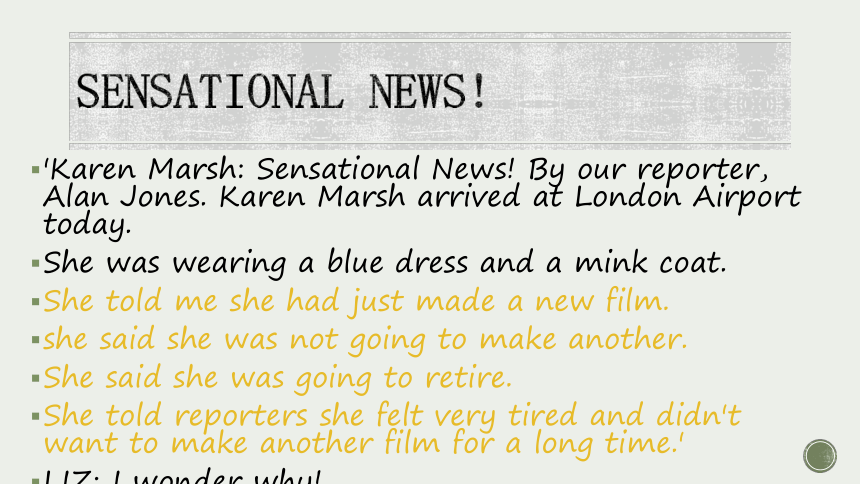
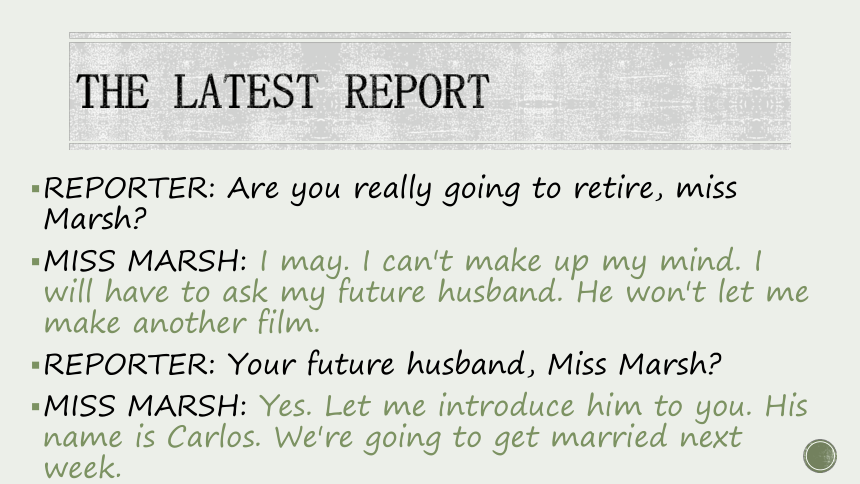
文档简介
(共14张PPT)
direct speech & indirect speech
Winds that carried the moist rich smell of a forest floor, the smell of a million flowers. Fierce winds that churned and moved the sea like yeast, or winds that made the waters lap at the shore like a kitten.
—All this I want to do with you
a card from jimmy
GRANDMOTHER: Read Jimmy's card to me please, penny.
PENNY: 'I have just arrived in Scotland and I'm staying at a Youth Hostel.'
GRANDMOTHER: Eh
PENNY: He says he has just arrived in Scotland. He says he is staying at a Youth Hostel. You know he's a member of the Y.H.A.
GRANDMOTHER: The what
PENNY: The Y.H.A., Mum. The Youth Hostels Association.
a card from jimmy
GRANDMOTHER: What else does he say
PENNY: 'I'll write a letter soon. I hope you all well.'
GRANDMOTHER: What Speak up. Penny. I'm afraid I can't hear you
PENNY: He says he'll write a letter soon. He hopes we are all well. 'Love, Jimmy.'
GRANDMOTHER: Is that all He doesn't say very much, does he
PENNY: He can't write very much on a card, Mum.
sensational news!
REPORTER: Have you just made a new film, Miss Marsh
MISS MARSH: Yes, I have.
REPORTER: Are you going to make a another
MISS MARSH: No, I'm not.
I'm going to retire. I feel very tired.
I don't want to make another film for a long time.
KATE: Let's buy a newspaper, Liz. Listen to this!
sensational news!
'Karen Marsh: Sensational News! By our reporter, Alan Jones. Karen Marsh arrived at London Airport today.
She was wearing a blue dress and a mink coat.
She told me she had just made a new film.
she said she was not going to make another.
She said she was going to retire.
She told reporters she felt very tired and didn't want to make another film for a long time.'
LIZ: I wonder why!
the latest report
REPORTER: Are you really going to retire, miss Marsh
MISS MARSH: I may. I can't make up my mind. I will have to ask my future husband. He won't let me make another film.
REPORTER: Your future husband, Miss Marsh
MISS MARSH: Yes. Let me introduce him to you. His name is Carlos. We're going to get married next week.
KATE: Look, Liz! Here's another report about Karen Marsh.
the latest report
Listen: 'Karen Marsh: The latest. At her London Hotel. Today Miss Marsh told reporters she might retire.
She said she couldn't make up her mind.
She said she would have to ask her future husband.
She said her future husband would not let her make another film.
Then she introduced us to Carlos and told us they would get married next week'.
LIZ: That's sensational news, isn't it, Kate
KATE: It certainly is. He'll be her sixth husband!
Direct and Indirect Speech (1)
1.转述他人的陈述→陈述句
→ She asked me what I was doing.
1) He said , “I’m going to Beijing.”
→ He said that he was going to Beijing.
2) He asked, “Are you a teacher ”
→ He asked me if /whether I was a teacher.
3) She said , “What are you doing ”
2.转述他人的疑问→一般疑问句
3.转述他人的问题→特殊疑问句
1.Declarative sentence
“I don’t like computers,” Sarah said to her friends.
Sarah said to her friends
that
I don’t like
computers.
didn’t
she
Sarah said to her friends that she didn’t like computers.
He said, “Do you have any difficulty with pronunciation ”
He asked (me) whether/if I had any difficulty with my pronunciation.
He said, “You are interested in English, aren't you ”
He asked whether I was interested in English.
间接引语用连词whether或if引导,原主句中谓语动词said要改为asked(me/him/us等),语序是陈述句的语序。
2.General question
Is it easy to improve the condition of the soil
( They asked him )
They asked him
if
It is easy to improve the condition of the soil.
it is easy to improve the condition of the soil.
is
was
They asked him if it was easy to improve the condition of the soil.
2.General question
When do you harvest the wheat
( They asked him )
They asked him
When
you harvest the wheat
you harvest the wheat.
he
harvested
They asked him when he harvested the wheat.
3.Special question
1.主句谓语动词的时态是现在时态,在引述时;
2. 当直接引语部分带有具体的过去时间状语时 ;
3. 直接引语如果是客观真理;
4. 当引语是谚语、格言时
5. 当直接引语中有情态动词should, would, could, had better, would rather, might, must, ought to, used to, need时,时态不变。
从句时态无须改变的还有这些情况
direct speech & indirect speech
Winds that carried the moist rich smell of a forest floor, the smell of a million flowers. Fierce winds that churned and moved the sea like yeast, or winds that made the waters lap at the shore like a kitten.
—All this I want to do with you
a card from jimmy
GRANDMOTHER: Read Jimmy's card to me please, penny.
PENNY: 'I have just arrived in Scotland and I'm staying at a Youth Hostel.'
GRANDMOTHER: Eh
PENNY: He says he has just arrived in Scotland. He says he is staying at a Youth Hostel. You know he's a member of the Y.H.A.
GRANDMOTHER: The what
PENNY: The Y.H.A., Mum. The Youth Hostels Association.
a card from jimmy
GRANDMOTHER: What else does he say
PENNY: 'I'll write a letter soon. I hope you all well.'
GRANDMOTHER: What Speak up. Penny. I'm afraid I can't hear you
PENNY: He says he'll write a letter soon. He hopes we are all well. 'Love, Jimmy.'
GRANDMOTHER: Is that all He doesn't say very much, does he
PENNY: He can't write very much on a card, Mum.
sensational news!
REPORTER: Have you just made a new film, Miss Marsh
MISS MARSH: Yes, I have.
REPORTER: Are you going to make a another
MISS MARSH: No, I'm not.
I'm going to retire. I feel very tired.
I don't want to make another film for a long time.
KATE: Let's buy a newspaper, Liz. Listen to this!
sensational news!
'Karen Marsh: Sensational News! By our reporter, Alan Jones. Karen Marsh arrived at London Airport today.
She was wearing a blue dress and a mink coat.
She told me she had just made a new film.
she said she was not going to make another.
She said she was going to retire.
She told reporters she felt very tired and didn't want to make another film for a long time.'
LIZ: I wonder why!
the latest report
REPORTER: Are you really going to retire, miss Marsh
MISS MARSH: I may. I can't make up my mind. I will have to ask my future husband. He won't let me make another film.
REPORTER: Your future husband, Miss Marsh
MISS MARSH: Yes. Let me introduce him to you. His name is Carlos. We're going to get married next week.
KATE: Look, Liz! Here's another report about Karen Marsh.
the latest report
Listen: 'Karen Marsh: The latest. At her London Hotel. Today Miss Marsh told reporters she might retire.
She said she couldn't make up her mind.
She said she would have to ask her future husband.
She said her future husband would not let her make another film.
Then she introduced us to Carlos and told us they would get married next week'.
LIZ: That's sensational news, isn't it, Kate
KATE: It certainly is. He'll be her sixth husband!
Direct and Indirect Speech (1)
1.转述他人的陈述→陈述句
→ She asked me what I was doing.
1) He said , “I’m going to Beijing.”
→ He said that he was going to Beijing.
2) He asked, “Are you a teacher ”
→ He asked me if /whether I was a teacher.
3) She said , “What are you doing ”
2.转述他人的疑问→一般疑问句
3.转述他人的问题→特殊疑问句
1.Declarative sentence
“I don’t like computers,” Sarah said to her friends.
Sarah said to her friends
that
I don’t like
computers.
didn’t
she
Sarah said to her friends that she didn’t like computers.
He said, “Do you have any difficulty with pronunciation ”
He asked (me) whether/if I had any difficulty with my pronunciation.
He said, “You are interested in English, aren't you ”
He asked whether I was interested in English.
间接引语用连词whether或if引导,原主句中谓语动词said要改为asked(me/him/us等),语序是陈述句的语序。
2.General question
Is it easy to improve the condition of the soil
( They asked him )
They asked him
if
It is easy to improve the condition of the soil.
it is easy to improve the condition of the soil.
is
was
They asked him if it was easy to improve the condition of the soil.
2.General question
When do you harvest the wheat
( They asked him )
They asked him
When
you harvest the wheat
you harvest the wheat.
he
harvested
They asked him when he harvested the wheat.
3.Special question
1.主句谓语动词的时态是现在时态,在引述时;
2. 当直接引语部分带有具体的过去时间状语时 ;
3. 直接引语如果是客观真理;
4. 当引语是谚语、格言时
5. 当直接引语中有情态动词should, would, could, had better, would rather, might, must, ought to, used to, need时,时态不变。
从句时态无须改变的还有这些情况
